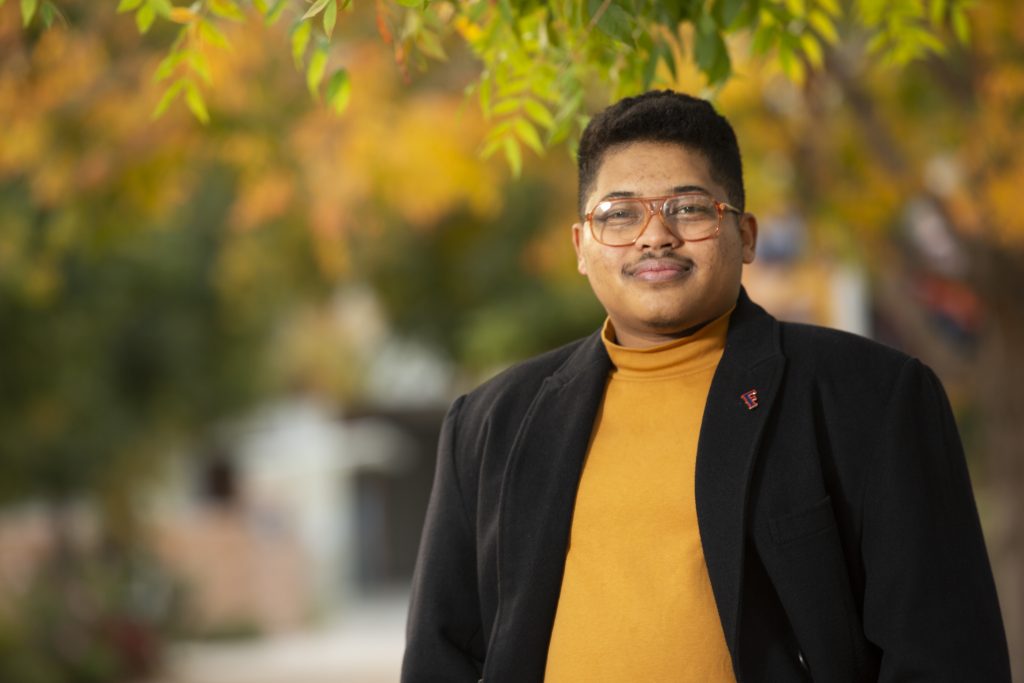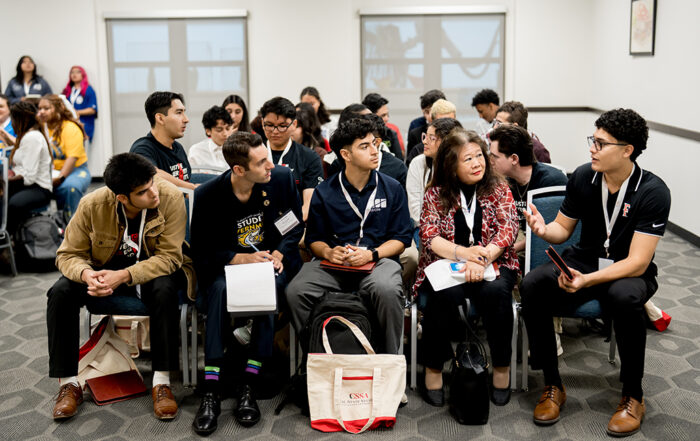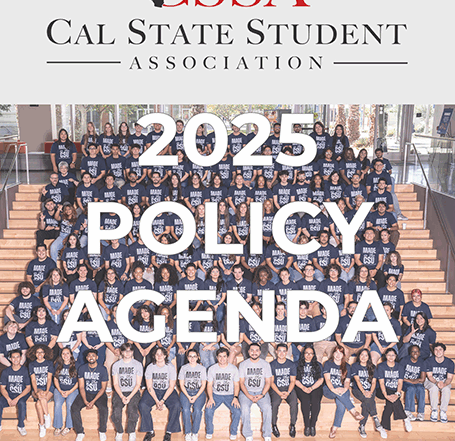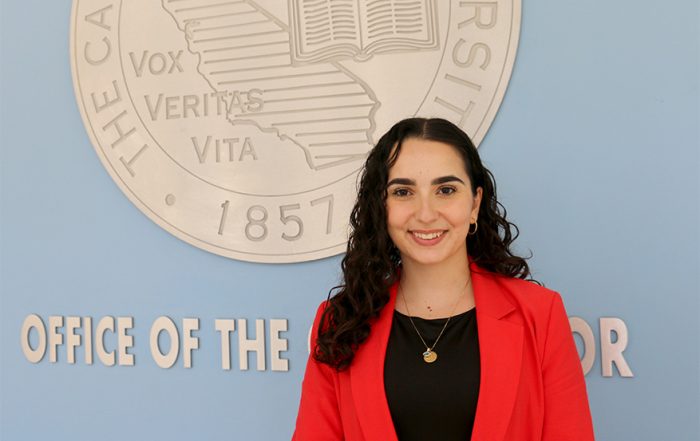
November 2021 | CSSA President Alferos’ Report to the CSU Board of Trustees
November 10, 2021
Thank you Chair Kimbell and good morning to our Board of Trustees
Seeing as how, like many of you, this is my first in-person Trustees meeting, I must say that this moment is truly special. It is my pleasure to meet you all in person, but I also am proud of the progress demonstrated by our systemwide leadership and state vaccination efforts that have allowed us to meet safely, in person, once again.
Before I continue, I would like to personally thank President Jimenez-Sandoval and President Yao for their hospitality upon my visit to their campuses. As I have resumed the campus visits my predecessors took on, I have been grateful to take away key insights from both of you that will be critical in the work of CSSA. Thank you for your service to our students and for inviting me to attend, and I look forward to visiting more campuses in the future.
Since last speaking to you all, CSSA has continued to strategically advance the voice of our students. And though we have been busy in our diverse actions, I want to specifically highlight the finalized 2022 Policy Agenda that our Board of Directors passed last month.
This Policy Agenda is reflective of a new process I authorized this year in an effort to be more responsive to student needs and more actionable. Through the efforts of our dedicated Associate Director Chris Woolett, we have put together an agenda that I believe is not only comprehensive but seeks to address the core equity issues facing our system.
In this agenda, our students are committed to 4 Priorities: Accessibility of Baseline Services, Student Health and Safety, Academic Success and Holistic Experience, and Systemwide Environmental Sustainability. Within each priority are many goals that range from addressing food insecurity, support systems for students with dependents, assessment of classroom technology, infrastructure and student mental health services. Elements that we are pleased to see reflected in this year’s budget request. Our students are ready to advocate and we look forward to working with all CSU stakeholders to procure the much needed resources for our system.
Notably, this Policy Agenda reflects shared priorities across the CSU. Like our CSU leadership, our students are committed to pushing for a holistic care approach to Basic Needs. Like our leadership, we are committed to increasing faculty diversity, eradicating existing equity gaps, and creating a more sustainable CSU. I am happy to report that our collaboration in CSUCCESS and key legislative victories mean that we are already at work actualizing this Policy Agenda.
Additionally, in the spirit of our time, I want to take a moment to extend my gratitude to the unsung leaders whose efforts have fundamentally changed our system. First, I want to acknowledge the work of our incredible student leaders who have worked tirelessly and intently during a crisis we truly were not prepared for. I would like to remind this Board that though surviving this crisis required all hands on deck, none of us would be here if it were not for the proactive leadership of our students, who’s efforts not only kept each other safe, but also brought our students back with the support systems they needed, all the while never missing a beat in their advocacy efforts. I also want to acknowledge and thank Chancellor Castro for working alongside CSSA to spearhead a new form of partnership. Though CSSA has worked with many Chancellors before, Chancellor Castro has readily met us in our commitment to serving as partners in higher education policy, including myself and CSSA’s Vice Presidents in planning, execution, and implementation of systemwide policies. It is this proactive effort that helps model the golden rule of our system: our shared governance.
It is in line with this that I feel I must share a key area of concern. Over the past 6 months of my term, I have continued to keep up with student leaders. I continue to hear stories of student leaders who attempt to meet with their administrators to address the critical issue that is policing on our campus, only to be felt left out of the shared governance process that we all hold so near and dear to us.”
Shared governance is truly the backbone of our system. It is what allows us to bring stakeholders to the table and ensure that we are including all perspectives and building raving fans behind our policy efforts. And though I recognize shared governance is easy when we are in agreement, and it is notably more difficult to respect and protect shared governance when the issue is contentious, that is not when shared governance truly reeps its full value. It is these exact issues, the ones where we cannot seem to come to a common understanding, the ones where students are relentless and willing to advocate for their ideas, the ones where the core issue calls to question the very foundation of who we set out to be, that shared governance really matters. And what concerns me about this environment that some of our campuses have created is that it is not only upholding the shared governance that exists at the core of our institution.
Because the reality is that policing and other issues related to campus safety pose a threat to our modern education system. It inhibits us from truly reaching all students and serves as a looming reminder of just how far we are willing to push ourselves to support students. Though we have accepted that every facet of our institutions should be readily available to change in order to support student success, students for too long have felt that policing is not held to the same standard. This perpetuates an exclusivity that inhibits us from taking a comprehensive look at student success and wellbeing. As a result, we have created a piece-meal safety net around our students, one where our hurried efforts to provide necessary support without threatening our very foundation results in us losing thousands of students. If in the last 22 months that we have been virtual, our campus leaders have been vocal about the needed transformation on our campuses, if in the wake of the lynching’s of innocent Black folks across the country our leaders responded with renewed commitments to “eliminate equity gaps”, “create more inclusive campuses”, and fatefully “create an anti-racist campus” then I feel I must remind you that these promises require actions in partnership with your students. Anti racism is not a noun but a verb. It is not a title held but action taken. But the only way we can actualize these promises is if we abandon our practice of throwing shared governance to the way-side whenever it proves inconvenient.
Trustees, Campus Presidents, and students alike, hear me when I say that we cannot have a future if we are not ardent defenders of our shared governance. We cannot make any progress if we do not intend to face the hardest issues. We cannot pride ourselves in leading the nation in equity, diversity, and transformative education if we are not also fully willing to confront the impacts of the systemic issues in this country that created inequities in the first place.
As a result, I am announcing that, under my leadership, I will be convening a Campus Safety Workgroup to bring together student leaders and provide best practices on how to address policing on their campuses. It is through this that I will work with student leaders and organizers across our system to help develop and discuss campus based strategies to address the critical issue of campus safety and propel our CSU as a leader in a truly equitable and inclusive campus environment.
And though I share these comments with earnesty and respect, I also come to you as a student looking for accountability in the system that has made me. I am a proud product of the CSU, from a family that is proud to be made in the CSU, and am disheartened by the stories I hear, not just because it contradicts the backbone of the system I know, but because I know we can do better. In my tenure, I have been able to build a partnership with Chancellor Castro that has set a new standard for how students can be informed and strategic partners in policy making. And as thankful as I am for that partnership, I wish to expand this model to all of our 23 campuses. As of right now, our student leaders have come to the table, ready to work together, negotiate, and create plans for the future of our institutions, and many of them have been left sitting there alone. I urge all our campus leaders to meet students where they are, to engage in the hard issues that will define the future of our education system, and to help re-instill a trust in the institutions we serve. It is through this partnership that we will not only ensure that our campuses are truly committed to eradicating equity gaps, but that we continue to be a national leader in providing a quality and diverse education.
Chair Kimbell, that concludes my report



